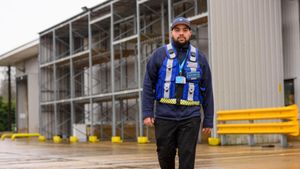Nearly two months have passed since Israel intensified its military operations against Hezbollah, and as the rhythms of daily life change drastically, residents of Lebanon are grappling with feelings of fear, loss, and uncertainty. Reports of bombing have invaded the quiet of the Lebanese night, creating chaos and horror for families within Beirut and beyond. Each dawn conceals memories of fiery explosions, and the citizens find themselves desensitized to the perils of the world around them.
Craig Murray, visiting the war-torn region, documents first-hand what it's like to navigate daily life under the constant barrage of drone surveillance and airstrikes. His report reflects on the surreal experience of traveling to Lebanon, where ominous checkpoints manned by armed civilians are reminders of the active conflict. Murray arrived with the intent to capture stories and truths missed by mainstream media narratives, often colored by pro-Israel sentiments. "We knew other activists who had faced hurdles upon arriving; I wanted to reach the heart of the story directly," he explains.
Upon disembarking from his flight, the almost vacant Beirut Airport hinted at the overwhelming fear keeping many away. Murray describes witnessing only small clusters of passengers, echoing the city’s altered state — devoid of its typical vibrancy. Waiting through immigration, he and his travel companion felt the weight of anticipation hang heavily over them. "The terminal was nearly empty, and our presence felt strangely out of place," Murray recounts. Despite being initially promised assistance from local sponsors, they found themselves lost within bureaucratic delays.
This bureaucratic chaos quickly transformed when they made their way outside, greeted by the unflagging sound of Israeli drones overhead — “a noise impossible to ignore,” says Murray. This has become the norm, as the sound drone attacks, often more oppressive than even the roar of heavy traffic, serves as another reminder of the deadly potential lurking just above.
The backdrop of tension and terror is painted vividly through Murray’s encounters with civilians affected by the conflict. His days have become intertwined with the lives of refugees who have found shelter within the Bossa Nova hotel, many of whom have been forced from their homes by bombings targeting residential areas. Around 1.2 million people have been displaced; Murray knows the stories behind the faces of these refugees all too well.
“People sit listless and morose, filling time doing nothing,” Murray describes. Simple interactions — sharing food, exchanging glances — have become fraught with emotional weight. But among the children, there still exists moments of joy, fleeting reminders of the innocence so often marred by conflict. Yet as soon as the loud whirr of drones fills the air, the playfulness dissipates, prompting anxious parents to call their little ones inside.
Pascale Sawma, another voice reporting from Lebanon, offers insights reflecting the growing normalization of violence and destruction within the country. Her experience resonates with Murray’s observations: "I wake up each day to the same sentence: ’It was a violent night in Beirut’s southern suburbs.’” The monotony breeds despair as the increasing frequency of strikes echoes through the city, creating psychological trauma and desensitization—a prevailing theme amplifying the communal suffering.
The idea of war becoming habitual is both haunting and heartbreaking. Sawma shares poignant moments of human interaction amid chaos, noting how residents maintain their daily fabric. Yet beneath the surface lies the haunting truth—each person merely existing under threats which seem omnipresent. Stories of grief and loss have become familiar; lives once vibrant are now shrouded by monotonous reports of despair.
Despite attempts by the media to capture the barbarities of the situation, the reality remains far more complex. For every civilian subsequent casualty, there lies the recognition of life lost and devastated families left to cope without their loved ones. Murray’s report concludes with stark observations of bomb sites, personalizing the destruction. Civilians, not combatants, are the ones paying the price as buildings turned to rubble yield harrowing remnants of lives interrupted and futures snuffed out.
The refugee crisis deepens as each day brings more violence, displacing families, and turning cities from homes to mere ashes. The community reflects resilience among sorrow, yet the frequent cycles of violence plant seeds of confusion and hopelessness among those left behind. Murray’s documentation of these realities — the families, the children, and the traumatized — serves as timely journalism amid the whirlwind of noise surrounding the conflict.
Both Murray and Sawma’s narratives amplify the urgency of addressing this humanitarian crisis, which has swept through Lebanon. Their individual stories feed the larger tale — one of trauma, displacement, and the unyielding hope for peace amid adversity. They paint detailed pictures of lives forever altered by war, urging readers to understand the depth of suffering felt across the nation.
Yet amid the chaos and heartache, glimmers of hope remain. Families continue to pull together, sharing moments of laughter even as they hide from explosions. Children kick makeshift soccer balls on The Bossa Nova hotel courtyard, finding joy even if fleeting, and clinging to their innocence amid the rubble. Their laughter, though tinged with uncertainty, resonates through the hotel — defying the odds against the darkness surrounding them.
The world watches as Lebanon grapples with its identity, redefined under the heavy clouds of warfare. Murray and Sawma serve as beacons seeking to shed light on the reality faced by civilians – those who continue to endure amid relentless bombing and fear. Their reports remind us of the resilience of the human spirit, and the hope for recovery and peace, even when it seems painfully out of reach.



